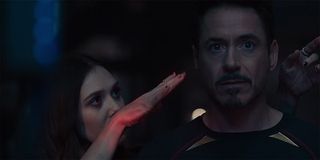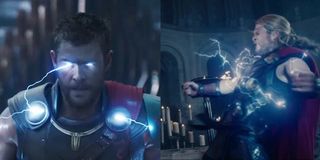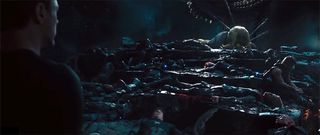One Very Important Thing We've Realized About Scarlet Witch In The MCU


In the pages of Marvel Comics, Scarlet Witch's powers have long been a bit tough to fully explain. Her beginnings saw her casting hexes (causing unlikely things to occur), which was eventually redefined as guidance of "chaos magic" -- but later it was retconned that her true ability is warping reality. To this point, the Marvel Cinematic Universe has side-stepped this confusion, suggesting that her abilities basically include mind and energy manipulation... but after reflecting on the events that go down in both Joss Whedon's The Avengers: Age of Ultron and Taika Waititi's Thor: Ragnarok, I find myself wondering if this is the full story. In actuality, there may be a lot more to the character's unusual gifts than what has been realized to this point on the big screen.
This conversation begins with a look back at a pivotal scene in The Avengers: Age of Ultron, specifically Thor's first encounter with Scarlet Witch in Ulysses Klaue's hideout. While he believes at first that he is too mighty to be put under a spell by mysterious young woman, that changes when he realizes that he has been "transported" to Asgard. It is here that he has a disturbing confrontation with Heimdall, who appears to be blinded. The Asgardian gatekeeper warns that the God of Thunder is leading them "to hell," and that the hero is by nature a destroyer. The nightmare ends as Thor is engulfed in lightning, and given glimpses of both the Infinity Stones and the future Avenger known as Vision.
If all of that sounds very familiar, it's because you watched the rest of Avengers: Age of Ultron and the entirety of Thor: Ragnarok. Not only does the Asgardian hero use one of the Infinity Stones to bring Vision to life in the former blockbuster, but he also goes on to encounter everything that Scarlet Witch put in his head in the latter: Heimdall has been removed from his position as gatekeeper; Asgard is indeed brought to hell, specifically through the arrival of Hela; Thor makes the decision let Asgard be destroyed, fulfilling the Ragnarok prophecy; and he realizes that his lightning powers are innate, and don't come from Mjolnir.
What are we to take from this? Scarlet Witch didn't just show Thor something to freak him out; she showed him a scary vision of the near future. That means she is performing a lot more than just mere mind manipulation -- and it's pretty significant for the future of the Marvel Cinematic Universe when you consider some of the other little plays that she puts on the minds of the Avengers.
Of course, the big one is the hallucination that Tony Stark is given in Baron Strucker's hidden base just before the title card in The Avengers: Age of Ultron. The hero also known as Iron Man is shown a hilltop full of dead Avengers -- a scenario made only more horrifying by Captain America's dying words, "You could have saved us. Why didn't you do more?" Meanwhile, a portal has opened up in the distance, with a full herd of Chitauri Leviathans flying towards Earth. In context, this clearly freaks Tony out because of what he went through during the Battle of New York, and it's what further inspires him to build a suit of armor around the world a.k.a. Ultron. Like with Thor, however, it may not be just some creepy dream. In a worst case scenario, it could easily be the end result of the titular team's confrontation with Thanos in The Avengers: Infinity War.

The second big question mark is what Captain America sees during the same Scarlet Witch encounter as Thor -- which is notably not really a nightmare. The star-spangled hero finds himself back in the 1940s, reunited with his true love, Peggy Carter, during a dance. Things are a bit strange, as flashbulbs going off, nearby scuffles, and even a wine spill remind him of the war, but it's hardly anything like the terror shown to his teammates. That odd tone is something that Tony Stark remarks on later in Avengers: Age of Ultron when the unit is hiding out at the Barton household, but could be much more significant than Steve Rogers not having a "dark side."
This is certainly digging way deeper into Informed Speculation Mode, but what if Captain America's vision is indeed what is waiting for him in the future? One of the Infinity Stones that Thanos is pursuing in The Avengers: Infinity War is the Time Stone, and it's not at all outside the realm of possibility that it could be used on the displaced hero -- sending him back to the past that he never had when he was frozen at the North Pole. There could even be a nice mental torture component to it, as Cap recognizes that the world is wrong, but doesn't fully understand why.
CINEMABLEND NEWSLETTER
Your Daily Blend of Entertainment News
That leaves us with what admittedly could be a challenge to the larger theory: the "spell" that Scarlet Witch casts on Black Widow. Unlike Thor, Tony and Steve, Natasha doesn't look into a horrifying future or a confused reality, but instead clearly revisits her own past. She is forced to relive her experiences at the Red Room Academy, which was the facility in Belarus where she was trained at a young age to become the ultimate spy and assassin. In the context of this feature there's less to read from this experience, as it doesn't really feature any kind of metaphor or hidden meanings... but that doesn't negate what's seen by the others. It's possible that this past experience in Natasha's mind was more suitable for Scarlet Witch's needs than anything more apocalyptic.
Naturally, there are some big unanswered questions that remain as a result of this theory. Does Scarlet Witch herself fully understand the extent of her powers? To what extent is she showing a version of the future versus creating one? What was it exactly that she showed Bruce Banner during that same Avengers: Age of Ultron encounter? This is all material that could be explored in both The Avengers: Infinity War and the untitled Avengers 4, and would be a fascinating way for the two movies to tie things back to some of the most important moments in the history of the Marvel Cinematic Universe.

Eric Eisenberg is the Assistant Managing Editor at CinemaBlend. After graduating Boston University and earning a bachelor’s degree in journalism, he took a part-time job as a staff writer for CinemaBlend, and after six months was offered the opportunity to move to Los Angeles and take on a newly created West Coast Editor position. Over a decade later, he's continuing to advance his interests and expertise. In addition to conducting filmmaker interviews and contributing to the news and feature content of the site, Eric also oversees the Movie Reviews section, writes the the weekend box office report (published Sundays), and is the site's resident Stephen King expert. He has two King-related columns.
Most Popular




